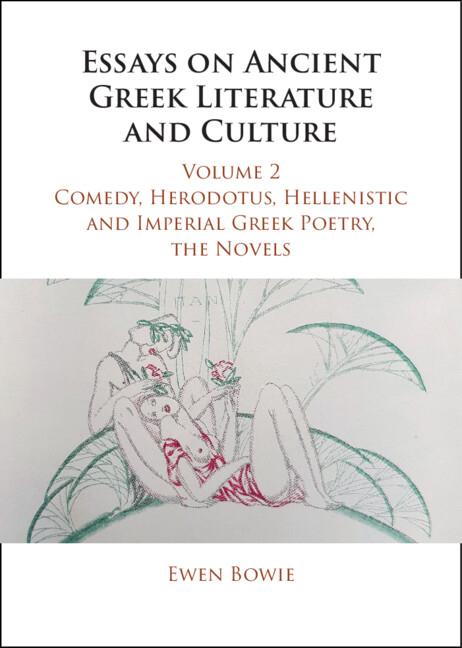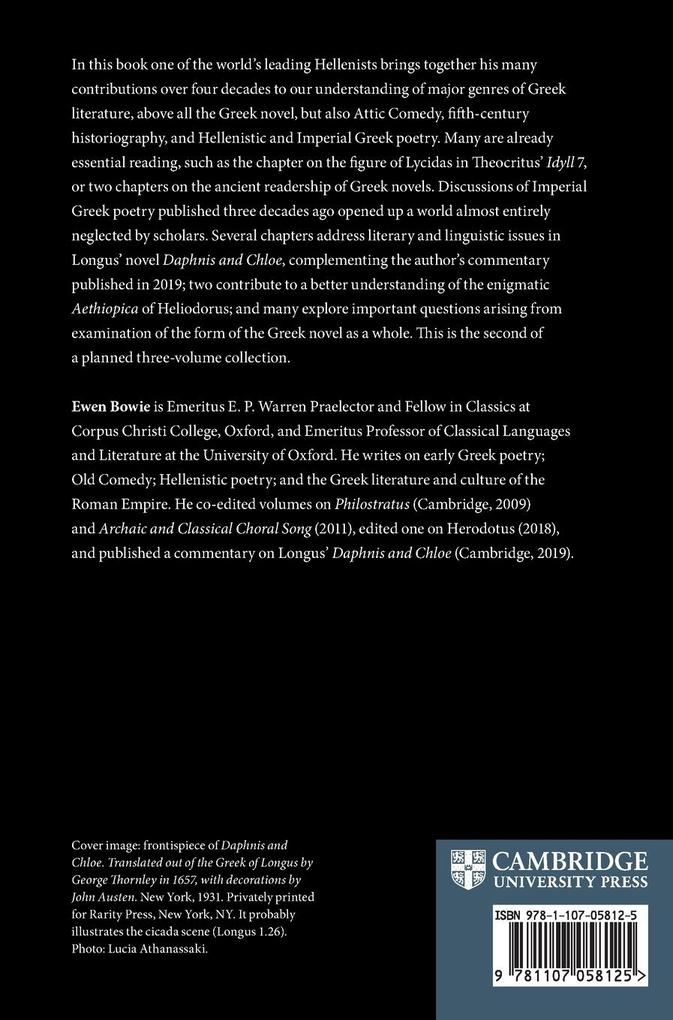
Zustellung: Do, 26.06. - Di, 01.07.
Versand in 2 Wochen
VersandkostenfreiBestellen & in Filiale abholen:
"In this book one of the world's leading Hellenists brings together his many contributions over four decades to our understanding of early Greek literature, above all of elegiac poetry and its relation to fifth-century prose historiography, but also of early Greek epic, iambic, melic and epigrammatic poetry. Many chapters have become seminal, e.g., that which first proposed the importance of now-lost long narrative elegies, and others exploring their performance contexts when papyri published in 1992 and 2005 yielded fragments of such long poems by Simonides and Archilochus. Another chapter argues against the widespread view that Sappho composed and performed chiefly for audiences of young girls, suggesting instead that she was a virtuoso singer and lyre-player, entertaining men in the elite symposia whose verbal and musical components are explored in several other chapters of the book "--
Inhaltsverzeichnis
Introduction; 1. 'Who is Dicaeopolis?' (1988); 2. 'Marginalia Obsceniora: some Problems in Aristophanes' Wasps' (1990); 3. 'Wine in Old Comedy' (1995); 4. 'Ionian Iambus and Old Attic Comedy: Father and Daughter, or Just Cousins?' (2002); 5. 'Socrates in Aristophanes' Clouds and the Audience of Attic Comedy' (2007); 6. 'Aristophanes Clouds: an Agonistic Note' (2015); 7. 'The Lesson of Book 2' (2018); 8. 'Theocritus' Seventh Idyll, Philetas and Longus' (1985); 9. 'Frame and Framed in Theocritus Poems 6 and 7' (1996); 10. The Reception of Apollonius Rhodius in Imperial Greek literature' (2000); 11. 'Time and Place, Narrative and Speech in Philicus, Philodamus and Limenius' (2015); 12. 'Greek Sophists and Greek Poetry in the Second Sophistic' (1989); 13. 'Poetry and Poets in Asia and Achaia' (1989); 14. 'Greek Poetry in the Antonine Age' (1990); 15. 'Hadrian and Greek poetry' (2002); 16. Dionysius of Alexandria: a Greek Poet in the Roman Empire (2004); 17. 'Luxury Cruisers? Philip's Epigrammatists between Greece and Rome' (2012); 18. 'Doing Doric' (2016); 19. 'The Novels and the Real World' (1977); 20. 'The Readership of Greek Novels in the Ancient World' (1994); 21. 'Philostratus: Writer of Fiction' (1994); 22. 'Names and a Gem: Aspects of Allusion in the Aethiopica of Heliodorus' (1995); 23. 'The Ancient Readers of the Greek Novels' (1996); 24. 'Phoenician Games in Heliodorus' Aethiopica' (1998); 25. 'The Chronology of the Earlier Greek Novels since B. E. Perry: Revisions and Precisions' (2002); 26. 'The Function of Mythology in Longus' Daphnis and Chloe' (2003); 27. 'Metaphor in Daphnis and Chloe' (2005); 28. 'The Construction of the Classical Past in the Ancient Greek Novels' (2006); 29. 'Viewing and Listening on the Novelist's Page' (2006); 30. 'Direct Speech in Longus, Daphnis and Chloe' (2006); 31. 'Pulling the Other: Longus and tragedy' (2007); 32. 'Links between Antonius Diogenes and Petronius' (2007); 33. 'Literary Milieux' (2008); 34. 'The Uses of Bookishness' (2009); 35. 'Country Virtues, City Vices, in Longus, Daphnis and Chloe?' (2009); 36. 'Socrates' Cock and Daphnis' Goats. The Rarity of Vows in the Religious Practice of the Greek Novels' (2012); 37. 'Caging Grasshoppers: Longus' Materials for Plaiting 'Reality'' (2013); 38. 'Milesian Tales' (2013); 39. 'A Land without Priests? Religious Authority in Longus, Daphnis and Chloe' (2015); 40. 'Poetic Elements in the Greek Novelists' Prose' (2017); 41. 'Captured Moments: Illustrating Longus' Prose' (2018); 42. ' ' (2019); 43. 'Animals, Slaves and Masters in Longus' Daphnis and Chloe' (2019); 44. 'The Demotion of the Literary Cowherd' (2019); 45. 'Callimachus and Longus' (2019); 46. 'Silence in Chariton, Xenophon, Achilles Tatius and Longus' (2020).
Produktdetails
Erscheinungsdatum
27. Juli 2023
Sprache
englisch
Seitenanzahl
750
Autor/Autorin
Ewen Bowie
Verlag/Hersteller
Produktart
gebunden
Gewicht
1887 g
Größe (L/B/H)
244/170/56 mm
ISBN
9781107058125
Bewertungen
0 Bewertungen
Es wurden noch keine Bewertungen abgegeben. Schreiben Sie die erste Bewertung zu "Essays on Ancient Greek Literature and Culture" und helfen Sie damit anderen bei der Kaufentscheidung.










